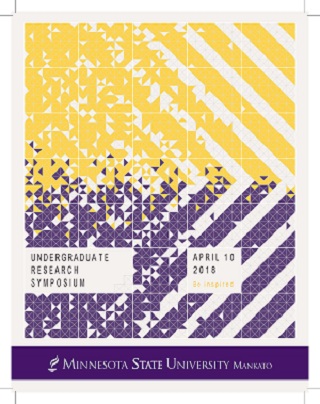Are We scaffolding? Using Teams for Problem-Based Learning in Child Development and Family Studies
Location
CSU Ballroom
Start Date
10-4-2018 10:00 AM
End Date
10-4-2018 11:30 AM
Student's Major
Family Consumer Science
Student's College
Allied Health and Nursing
Mentor's Name
Daniel Moen
Mentor's Department
Family Consumer Science
Mentor's College
Allied Health and Nursing
Description
Problem based learning (PBL), learning through the experience of solving problems, is suggested to be an effective teaching model. It is a student-centered pedagogy in which students learn a material by making some direct connections and applying what they have learned in class to solve a real-life problem. When applied within teams, it enables students to identify what they already know, what they need to know, and what ways they can use to access latest information. The Study is guided by sociohistorical theory of cognitive development (Vygotsky, 1978) and Bloom's taxonomy of learning (1956). The purpose of this study is to evaluate student's perceptions of problem based learning within teams in the area of family studies. This cross-sectional mixed method study uses data collection (Qualtrics survey) to assess and evaluate the perceptions of learning experiences in a survey response (n=104) of undergraduate students in an introduction level family studies course in a mid-western university. Overall, students reported significantly favorable experiences in working with teams on Problem Based Learning in terms of overall experience, comprehension, critical and creative thinking, gained insights, social skills, and conflict management. The study supports the idea that PBL within teams works effectively as it encourages the activation of prior knowledge in group setting and provides opportunities for elaboration on that knowledge.
Are We scaffolding? Using Teams for Problem-Based Learning in Child Development and Family Studies
CSU Ballroom
Problem based learning (PBL), learning through the experience of solving problems, is suggested to be an effective teaching model. It is a student-centered pedagogy in which students learn a material by making some direct connections and applying what they have learned in class to solve a real-life problem. When applied within teams, it enables students to identify what they already know, what they need to know, and what ways they can use to access latest information. The Study is guided by sociohistorical theory of cognitive development (Vygotsky, 1978) and Bloom's taxonomy of learning (1956). The purpose of this study is to evaluate student's perceptions of problem based learning within teams in the area of family studies. This cross-sectional mixed method study uses data collection (Qualtrics survey) to assess and evaluate the perceptions of learning experiences in a survey response (n=104) of undergraduate students in an introduction level family studies course in a mid-western university. Overall, students reported significantly favorable experiences in working with teams on Problem Based Learning in terms of overall experience, comprehension, critical and creative thinking, gained insights, social skills, and conflict management. The study supports the idea that PBL within teams works effectively as it encourages the activation of prior knowledge in group setting and provides opportunities for elaboration on that knowledge.
Recommended Citation
Cox, Arliah; Tess Leland; Micah Link; Geneva Kachinske; and Timnit Yikealo. "Are We scaffolding? Using Teams for Problem-Based Learning in Child Development and Family Studies." Undergraduate Research Symposium, Mankato, MN, April 10, 2018.
https://cornerstone.lib.mnsu.edu/urs/2018/poster-session-A/4




